外研版 英语 七年级下册 Module 11Body language Unit 2 习题 课件(共16张PPT)
文档属性
| 名称 | 外研版 英语 七年级下册 Module 11Body language Unit 2 习题 课件(共16张PPT) | 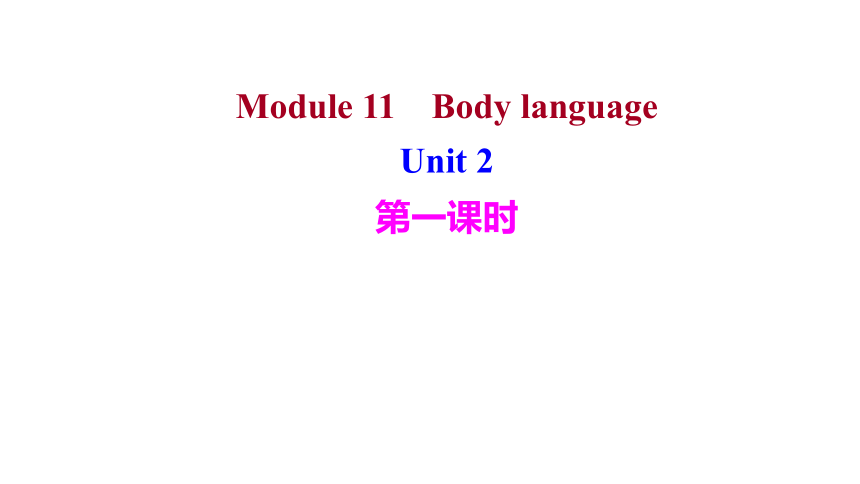 | |
| 格式 | ppt | ||
| 文件大小 | 258.5KB | ||
| 资源类型 | 教案 | ||
| 版本资源 | 外研版 | ||
| 科目 | 英语 | ||
| 更新时间 | 2022-06-10 10:54:37 | ||
图片预览

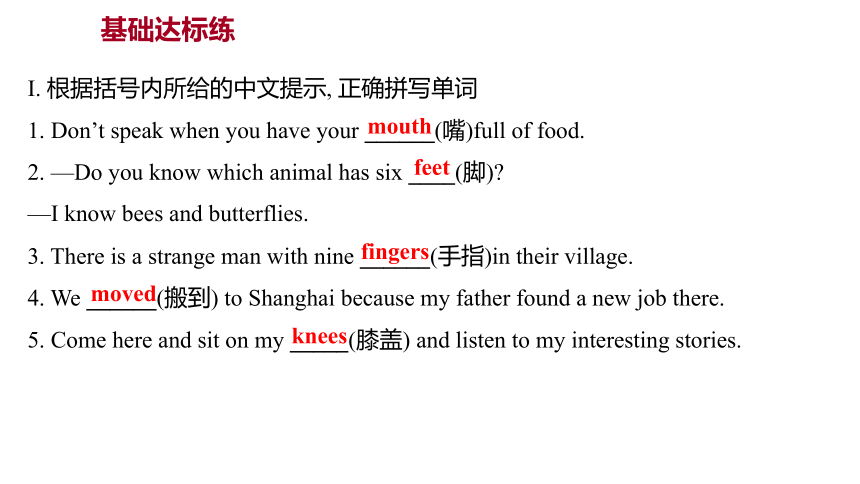
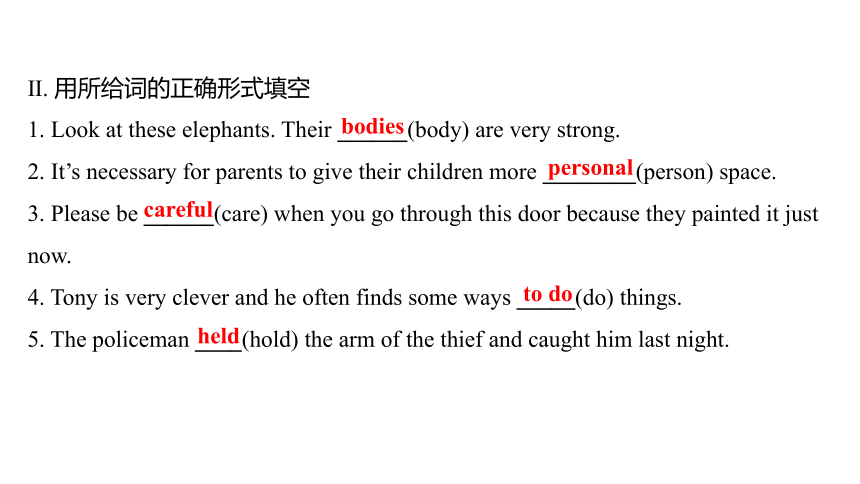
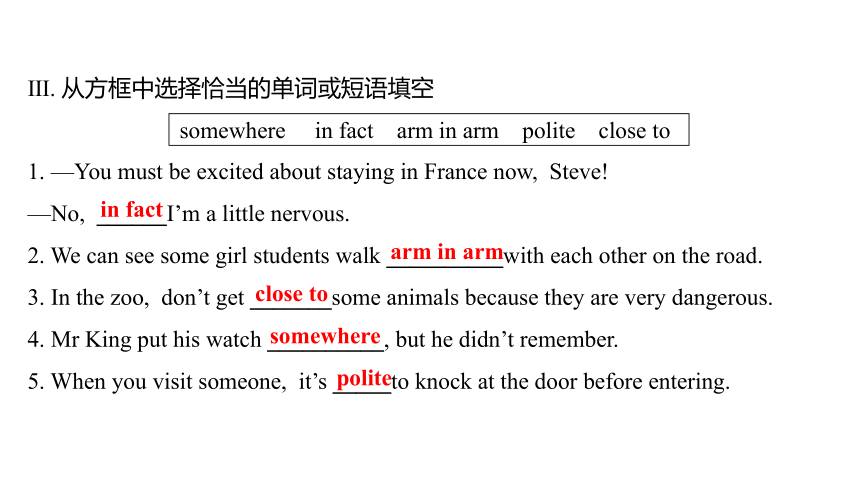
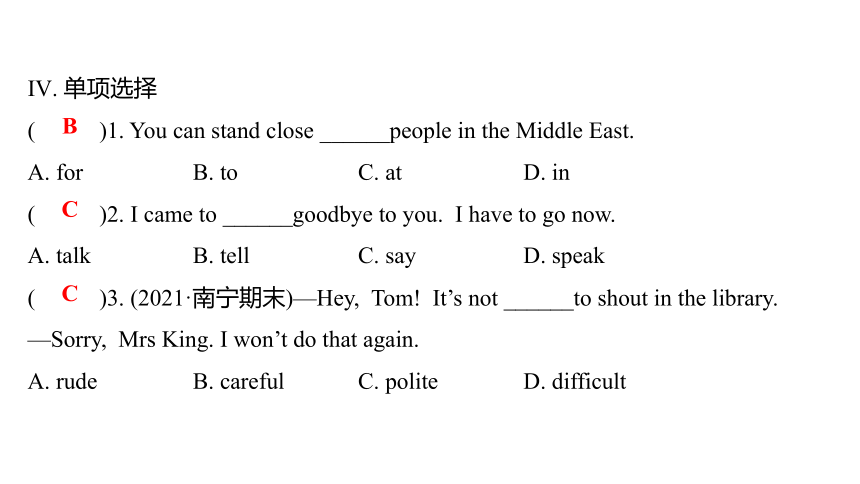
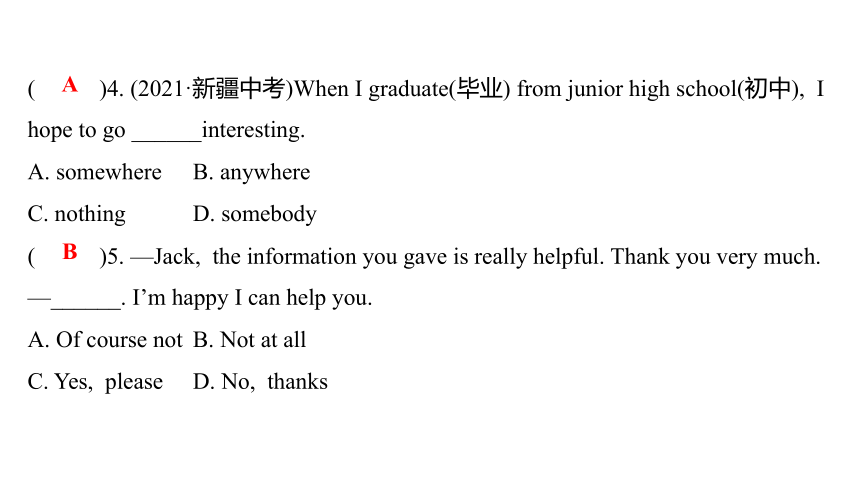
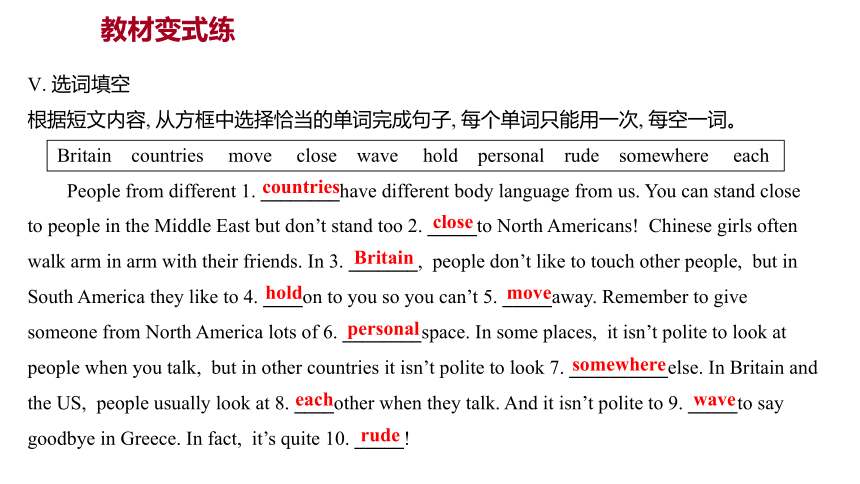
文档简介
(共16张PPT)
Module 11 Body language
Unit 2
第一课时
基础达标练
Ⅰ. 根据括号内所给的中文提示, 正确拼写单词
1. Don’t speak when you have your ______(嘴)full of food.
2. —Do you know which animal has six ____(脚)
—I know bees and butterflies.
3. There is a strange man with nine ______(手指)in their village.
4. We ______(搬到) to Shanghai because my father found a new job there.
5. Come here and sit on my _____(膝盖) and listen to my interesting stories.
mouth
feet
fingers
moved
knees
Ⅱ. 用所给词的正确形式填空
1. Look at these elephants. Their ______(body) are very strong.
2. It’s necessary for parents to give their children more ________(person) space.
3. Please be ______(care) when you go through this door because they painted it just
now.
4. Tony is very clever and he often finds some ways _____(do) things.
5. The policeman ____(hold) the arm of the thief and caught him last night.
bodies
personal
careful
to do
held
Ⅲ. 从方框中选择恰当的单词或短语填空
somewhere in fact arm in arm polite close to
1. —You must be excited about staying in France now, Steve!
—No, ______I’m a little nervous.
2. We can see some girl students walk __________with each other on the road.
3. In the zoo, don’t get _______some animals because they are very dangerous.
4. Mr King put his watch __________, but he didn’t remember.
5. When you visit someone, it’s _____to knock at the door before entering.
in fact
arm in arm
close to
somewhere
polite
Ⅳ. 单项选择
( )1. You can stand close ______people in the Middle East.
A. for B. to C. at D. in
( )2. I came to ______goodbye to you. I have to go now.
A. talk B. tell C. say D. speak
( )3. (2021·南宁期末)—Hey, Tom! It’s not ______to shout in the library.
—Sorry, Mrs King. I won’t do that again.
A. rude B. careful C. polite D. difficult
B
C
C
( )4. (2021·新疆中考)When I graduate(毕业) from junior high school(初中), I
hope to go ______interesting.
A. somewhere B. anywhere
C. nothing D. somebody
( )5. —Jack, the information you gave is really helpful. Thank you very much.
—______. I’m happy I can help you.
A. Of course not B. Not at all
C. Yes, please D. No, thanks
A
B
教材变式练
Ⅴ. 选词填空
根据短文内容, 从方框中选择恰当的单词完成句子, 每个单词只能用一次, 每空一词。
Britain countries move close wave hold personal rude somewhere each
People from different 1. ________have different body language from us. You can stand close
to people in the Middle East but don’t stand too 2. _____to North Americans! Chinese girls often
walk arm in arm with their friends. In 3. _______, people don’t like to touch other people, but in
South America they like to 4. ____on to you so you can’t 5. _____away. Remember to give
someone from North America lots of 6. ________space. In some places, it isn’t polite to look at
people when you talk, but in other countries it isn’t polite to look 7. __________else. In Britain and
the US, people usually look at 8. ____other when they talk. And it isn’t polite to 9. _____to say
goodbye in Greece. In fact, it’s quite 10. _____!
countries
close
Britain
hold
move
personal
somewhere
each
wave
rude
Module 11 Body language
Unit 2
第二课时
基础达标练
Ⅰ. 根据括号内所给的中文提示, 正确拼写单词
1. Tom, it’s not _____(礼貌的)to shout at others.
2. Lily isn’t Chinese. She is from a _______(外国的) country.
3. This old lady is 92 years old, but her _____(身体) is very strong.
4. It is _____(粗鲁的)to talk loudly on the phone in public places.
5. Tom Brown likes travelling and he wants to see __________(某个地方)
interesting.
polite
foreign
body
rude
somewhere
Ⅱ. 用方框中所给的单词或短语填空
in fact leg arm in arm personal close to
1. Some girls walked __________on the road when the car appeared.
2. ______I can’t work out this math problem. I need your help, Tom.
3. It is not polite to ask a stranger questions about his ________ life.
4. Don’t get _______North Americans. They don’t like that.
5. Tony hurt his left ___ in the match but he still tried to complete the match.
arm in arm
In fact
personal
close to
leg
综合能力练
Ⅲ. 判断正误
With the holidays coming up, many people will have parties. Want to be a good host or guest (主人或客人) Now it’s time to learn about some party manners (礼仪).
Be a host
Don’t start any activity (活动) before all your guests arrive. And the people at the party may not know each other. So make sure you introduce (介绍) everyone. Then your guests can relax and really have fun.
If your guests bring presents to you, thank each present giver when you open his or her present after the party. Be sure to send a hand-written thank-you card to each of them. It’s a good idea to let them know you enjoy their presents.
Be a guest
You should arrive on time. It’s not good to come late. Bring a present to a birthday party. It can be some flowers, a cake or some chocolate. If it’s a holiday party, ask the host if here’s anything you can bring. Remember to say “Please” and “Thank you” to other guests. They are magic (神奇的) words and they can make everyone feel comfortable. And when you leave, please say “Thank you” to the host.
根据语篇内容, 判断下列句子正(T)误(F)。
( )1. Don’t start any activity before all your guests arrive.
( )2. If you are a host, you should introduce everyone.
( )3. If you are a guest, send a hand-written thank-you card to the host.
( )4. Don’t bring flowers to a birthday party.
( )5. When you leave, please say “Thank you” to the guest.
T
T
F
F
F
Ⅳ. 阅读理解
Different countries have different body languages. For example, men in Russia, France and Arab countries kiss each other when they meet, but men in China or Australia shake hands instead of kissing.
People in Puerto Rico like touching each other, but people from English-speaking countries do not touch each other. If you touch an English person, you should say “Sorry”. People keep a distance (距离) when they are talking.
In some Asian countries, you must not touch the head of another person. In Arab countries, you eat with your right hand. Don’t use your left hand.
In parts of Asia, you must not sit with your feet pointing at another person.
When you use a foreign language, it is very important to know the meanings of their body language. It will make your stay there much more pleasant.
( )1. In ______men do not kiss each other when they meet.
A. Russia B. France C. Arab D. Australia
( )2. People in Puerto Rico like to ______when they meet.
A. touch each other B. kiss each other
C. shake hands D. say “Sorry”
( )3. What do English people do when they are talking
A. Keep a distance. B. Stand close.
C. Shake hands. D. Hand in hand.
D
A
A
( )4. In some ______countries, you must not sit with your feet pointing at
another person.
A. European B. American C. Asian D. African
( )5. What does the underlined word “It” mean in the last paragraph It refers
______.
A. to speak your mother language
B. to follow the customs
C. to know their body languages
D. to talk to people
C
C
Module 11 Body language
Unit 2
第一课时
基础达标练
Ⅰ. 根据括号内所给的中文提示, 正确拼写单词
1. Don’t speak when you have your ______(嘴)full of food.
2. —Do you know which animal has six ____(脚)
—I know bees and butterflies.
3. There is a strange man with nine ______(手指)in their village.
4. We ______(搬到) to Shanghai because my father found a new job there.
5. Come here and sit on my _____(膝盖) and listen to my interesting stories.
mouth
feet
fingers
moved
knees
Ⅱ. 用所给词的正确形式填空
1. Look at these elephants. Their ______(body) are very strong.
2. It’s necessary for parents to give their children more ________(person) space.
3. Please be ______(care) when you go through this door because they painted it just
now.
4. Tony is very clever and he often finds some ways _____(do) things.
5. The policeman ____(hold) the arm of the thief and caught him last night.
bodies
personal
careful
to do
held
Ⅲ. 从方框中选择恰当的单词或短语填空
somewhere in fact arm in arm polite close to
1. —You must be excited about staying in France now, Steve!
—No, ______I’m a little nervous.
2. We can see some girl students walk __________with each other on the road.
3. In the zoo, don’t get _______some animals because they are very dangerous.
4. Mr King put his watch __________, but he didn’t remember.
5. When you visit someone, it’s _____to knock at the door before entering.
in fact
arm in arm
close to
somewhere
polite
Ⅳ. 单项选择
( )1. You can stand close ______people in the Middle East.
A. for B. to C. at D. in
( )2. I came to ______goodbye to you. I have to go now.
A. talk B. tell C. say D. speak
( )3. (2021·南宁期末)—Hey, Tom! It’s not ______to shout in the library.
—Sorry, Mrs King. I won’t do that again.
A. rude B. careful C. polite D. difficult
B
C
C
( )4. (2021·新疆中考)When I graduate(毕业) from junior high school(初中), I
hope to go ______interesting.
A. somewhere B. anywhere
C. nothing D. somebody
( )5. —Jack, the information you gave is really helpful. Thank you very much.
—______. I’m happy I can help you.
A. Of course not B. Not at all
C. Yes, please D. No, thanks
A
B
教材变式练
Ⅴ. 选词填空
根据短文内容, 从方框中选择恰当的单词完成句子, 每个单词只能用一次, 每空一词。
Britain countries move close wave hold personal rude somewhere each
People from different 1. ________have different body language from us. You can stand close
to people in the Middle East but don’t stand too 2. _____to North Americans! Chinese girls often
walk arm in arm with their friends. In 3. _______, people don’t like to touch other people, but in
South America they like to 4. ____on to you so you can’t 5. _____away. Remember to give
someone from North America lots of 6. ________space. In some places, it isn’t polite to look at
people when you talk, but in other countries it isn’t polite to look 7. __________else. In Britain and
the US, people usually look at 8. ____other when they talk. And it isn’t polite to 9. _____to say
goodbye in Greece. In fact, it’s quite 10. _____!
countries
close
Britain
hold
move
personal
somewhere
each
wave
rude
Module 11 Body language
Unit 2
第二课时
基础达标练
Ⅰ. 根据括号内所给的中文提示, 正确拼写单词
1. Tom, it’s not _____(礼貌的)to shout at others.
2. Lily isn’t Chinese. She is from a _______(外国的) country.
3. This old lady is 92 years old, but her _____(身体) is very strong.
4. It is _____(粗鲁的)to talk loudly on the phone in public places.
5. Tom Brown likes travelling and he wants to see __________(某个地方)
interesting.
polite
foreign
body
rude
somewhere
Ⅱ. 用方框中所给的单词或短语填空
in fact leg arm in arm personal close to
1. Some girls walked __________on the road when the car appeared.
2. ______I can’t work out this math problem. I need your help, Tom.
3. It is not polite to ask a stranger questions about his ________ life.
4. Don’t get _______North Americans. They don’t like that.
5. Tony hurt his left ___ in the match but he still tried to complete the match.
arm in arm
In fact
personal
close to
leg
综合能力练
Ⅲ. 判断正误
With the holidays coming up, many people will have parties. Want to be a good host or guest (主人或客人) Now it’s time to learn about some party manners (礼仪).
Be a host
Don’t start any activity (活动) before all your guests arrive. And the people at the party may not know each other. So make sure you introduce (介绍) everyone. Then your guests can relax and really have fun.
If your guests bring presents to you, thank each present giver when you open his or her present after the party. Be sure to send a hand-written thank-you card to each of them. It’s a good idea to let them know you enjoy their presents.
Be a guest
You should arrive on time. It’s not good to come late. Bring a present to a birthday party. It can be some flowers, a cake or some chocolate. If it’s a holiday party, ask the host if here’s anything you can bring. Remember to say “Please” and “Thank you” to other guests. They are magic (神奇的) words and they can make everyone feel comfortable. And when you leave, please say “Thank you” to the host.
根据语篇内容, 判断下列句子正(T)误(F)。
( )1. Don’t start any activity before all your guests arrive.
( )2. If you are a host, you should introduce everyone.
( )3. If you are a guest, send a hand-written thank-you card to the host.
( )4. Don’t bring flowers to a birthday party.
( )5. When you leave, please say “Thank you” to the guest.
T
T
F
F
F
Ⅳ. 阅读理解
Different countries have different body languages. For example, men in Russia, France and Arab countries kiss each other when they meet, but men in China or Australia shake hands instead of kissing.
People in Puerto Rico like touching each other, but people from English-speaking countries do not touch each other. If you touch an English person, you should say “Sorry”. People keep a distance (距离) when they are talking.
In some Asian countries, you must not touch the head of another person. In Arab countries, you eat with your right hand. Don’t use your left hand.
In parts of Asia, you must not sit with your feet pointing at another person.
When you use a foreign language, it is very important to know the meanings of their body language. It will make your stay there much more pleasant.
( )1. In ______men do not kiss each other when they meet.
A. Russia B. France C. Arab D. Australia
( )2. People in Puerto Rico like to ______when they meet.
A. touch each other B. kiss each other
C. shake hands D. say “Sorry”
( )3. What do English people do when they are talking
A. Keep a distance. B. Stand close.
C. Shake hands. D. Hand in hand.
D
A
A
( )4. In some ______countries, you must not sit with your feet pointing at
another person.
A. European B. American C. Asian D. African
( )5. What does the underlined word “It” mean in the last paragraph It refers
______.
A. to speak your mother language
B. to follow the customs
C. to know their body languages
D. to talk to people
C
C
同课章节目录
- Module 1 Lost and found
- Unit 1 Whose bag is this?
- Unit 2 Are they yours?
- Unit 3 Language in use
- Module 2 What can you do ?
- Unit 1 I can play the piano
- Unit 2 I can run really fast
- Unit 3 Language in use
- Module 3 Making plans
- Unit 1 What are you going to do at the weekends?
- Unit 2 We're going to cheer the players.
- Unit 3 Language in use
- Module 4 Life in the future
- Unit 1 Everyone will study at home
- Unit 2 Every family will have a small plane.
- Unit 3 Language in use
- Module 5 Shopping
- Unit 1 What can I do for you?
- Unit 2 You can buy everything on the Internet
- Unit 3 Language in use
- Module 6 Around town
- Unit 1 Could you tell me how to get to the Nationa
- Unit 2 The London Eye is on your right.
- Unit 3 Language in use
- Revision module A
- Module 7 My past life
- Unit 1 I was born in a small village.
- Unit 2 I was born in Quincy.
- Unit 3 Language in use
- Module 8 Story time
- Unit 1 Once upon a time….
- Unit 2 Goldilocks hurried out of the house.
- Unit 3 Language in use
- Module 9 Life history
- Unit 1 He left school and began work at the age of
- Unit 2 He decided to be an actor.
- Unit 3 Language in use
- Module 10 A holiday journey
- Unit 1 What did you do?
- Unit 2 This morning we took a walk.
- Unit 3 Language in use
- Module 11 Body language
- Unit 1 They touch noses!
- Unit 2 Here are some ways to welcome them.
- Unit 3 Language in use
- Module 12 Western music
- Unit 1 It's so beautiful!
- Unit 2 Vienna is the centre of European classical
- Unit 3 Language in use
- Revision module B
